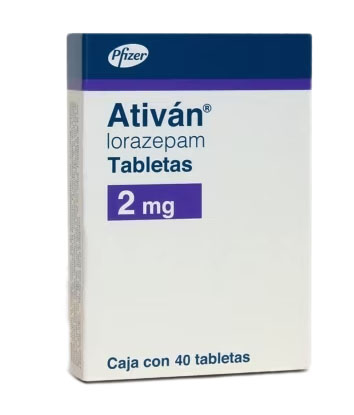Ativan (Lorazepam)
Ativan (Lorazepam) is a drug from the family of benzodiazepines, which works effectively for a wide range of health disorders, including anxiety and insomnia.
Every year more than 2.8 million Americans get a prescription for Ativan. Overall, the annual number of prescriptions reaches over 10.8 million ? a huge figure, which shows how popular this medication is.
Ativan belongs to the family of benzodiazepine medications. It was introduced to the US market in 1977, though the active substance of the drug, lorazepam, was patented much earlier, in 1963. Ativan got FDA approval and was added to the List of Essential Medicines by the WHO. This medication is a controlled substance with a high potential for abuse which is why Ativan is available by prescription only.
Buy Ativan (Lorazepam) Online Without Prescription
|
|
What Diseases Does Ativan Treat? How Does It Affect Your Body?
Ativan (Lorazepam) is a nervous system depressant, which enhances the effects of GABA receptors in the human brain. Its subjective effects show through sedation, muscle relaxation, suppression of anxiety, and seizure suppression.
According to the FDA label, Ativan should be used for depression-associated anxiety and anxiety associated insomnia. However, the off-label uses of Ativan are much more diverse. Your doctor may recommend taking Ativan for severe agitation, alcohol withdrawal, status epilepticus, and even nausea and vomiting provoked by chemotherapy.
Whatever the reason for you taking Ativan, it should be justified. This drug bears both benefits and risks, so both you and your doctor should weigh them before making a decision in favor of this treatment.
Ativan Dosages. What Dose is the Most Effective?
When comparing Ativan to other benzos, it can be classified as an intermediate-duration-of-action medication. The active substance of this drug, Lorazepam, has an elimination half-life of 10 ?20 hours. Despite its rather short period of stay in your body, the duration of the effect of Lorazepam ranges from 12 to 24 hours. Ativan comes in immediate-release tablets, which is why its effects last shorter than those of the extended-release formulation.
The pills contain 0.5 mg, 1 mg, or 2 mg of the active substance. If you are using an immediate-release formulation, you can split the pills into two (there is a dividing line on each tablet), thus reducing your dose. This should never be applied to the extended-release formulation as it will influence its effectiveness and many increase the risks of unwanted reactions.
The choice of the dosage and dosing schedule should be entrusted to your healthcare provider. It?s crucial to stick to the prescription and fulfill your doctor?s recommendations to avoid misuse, overdose, and dependence. Besides, by following your dosing schedule carefully, you?ll minimize your risks for adverse reactions, especially severe ones.
Weighing Benefits and Risks. Who Should Avoid Taking Ativan?
Although Ativan (Lorazepam) is usually well-tolerated by most people taking it, this medication can do more harm than benefit to individuals suffering from certain medical conditions. You should tell your doctor if you have or have had any of the listed-below health issues. Otherwise, you risk turning the treatment into a battle with severe adverse reactions.
- Acute narrow-angle glaucoma
- Hypersensitivity to benzodiazepines
- Depression (unless you get adequate therapy)
- Compromised breathing function
- Severe liver or kidney disease
Your age is another thing to take into account when thinking about treatment with Ativan. The safety of this drug in children younger than 12 has not been established. Elderly people may be recommended to take this medication with caution. Why? The elderly are more susceptible to the sedative effect of the drug. Besides, the risks of falls and hip fractures increase significantly with age.
Pregnant and lactating women are contraindicated to get treatment with Ativan as it may do harm to an unborn or nursing baby.
Side Effects Risks. Most Common Adverse Reactions
The incidence of Ativan adverse effects is dose-dependent. The higher your daily dose is, the severer your unwanted symptoms may be. The most common unwanted reactions to the drug appear to be:
- Sedation
- Dizziness
- Weakness
- Low blood pressure
- Unsteadiness
Like with other benzodiazepines, treatment with Ativan may provoke the so-called paradoxical reactions, which show through the exacerbation of the symptoms you are trying to get rid of. They may be agitation, increased frequency and severity of seizures, paradoxical excitement, and others. Such reactions are more common in the elderly, children aged 12 ? 18, and people with a history of substance abuse or psychiatric disorders.
Ativan may cause suicidal thoughts. Pay attention to your mood and seek help if you notice warning signs.
Summing up
Ativan can effectively soothe the symptoms of anxiety and help other medical conditions which need sedation and muscle relaxation. However, it should be used short-term and you should follow your doctor?s prescriptions carefully.


